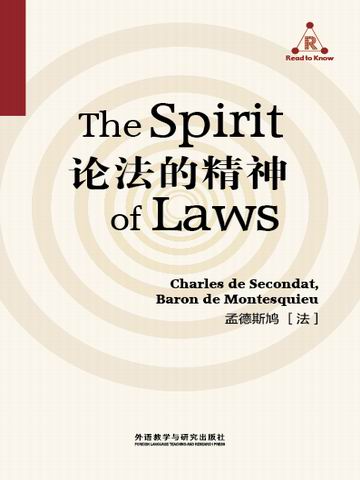被载入法国《人权宣言》和美国《独立宣言》的政治学著作。
in this book, Montesquieu explores the essentials of good government, compares and contrasts despotism, monarchy, and democracy, and discusses the factors that lead to corruption of governments. Among the many other topics considered are education of the citizenry, crime and punishment, abuse of power and of liberty, individual rights, taxation, slavery, the role of women, the influence of climate on the temper of a people and their form of government, commerce, religion, and a host of additional subjects.
孟德斯鸠在《法的精神》一书中提出法制、政治自由和权力分立,对神学和封建专制进行了有力的抨击,成为此后资产阶级大革命的政治纲领。特别是他第一次正式提出的分权与制衡理论,对近代以来的资产阶级政治实践和政治思想产生了直接而深远的影响。经过法、美资产阶级革命的实践,已经成为资产阶级国家构建民主制度和政权体制的组织原则。
The Spirit of Laws is a treatise on political theory first published anonymously by Montesquieu in 1748. In this political treatise Montesquieu pleaded in favor of a constitutional system of government and the separation of powers, the ending of slavery, the preservation of civil liberties and the law, and the idea that political institutions ought to reflect the social and geographical aspects of each community.
- The Translator to the Reader
- Preface
- Book I Of Laws in General
- Book II Of Laws Directly Derived from the Nature of Government
- Book III Of the Principles of the Three Kinds of Government
- Book IV That the Laws of Education Ought to Be in Relation to the Principles of Government
- Book V That the Laws Given by the Legislator Ought to Be in Relation to the Principle of Government
- Book VI Consequences of the Principles of Different Governments with Respect to the Simplicity of Civil and Criminal Laws, the Form of Judgments, and the Inflicting of Punishments
- Book VII Consequences of the Different Principles of the Three Governments with Respect to Sumptuary Laws, Luxury, and the Condition of Women
- Book VIII Of the Corruption of the Principles of the Three Governments
- Book IX Of Laws in the Relation They Bear to a Defensive Force
- Book X Of Laws in the Relation They Bear to Offensive Force
- Book XI Of the Laws Which Establish Political Liberty, with Regard to the Constitution
- Book XII Of the Laws That Form Political Liberty, in Relation to the Subject
- Book XIII Of the Relation Which the Levying of Taxes and the Greatness of the Public Revenues Bear to Liberty
- Book XIV Of Laws in Relation to the Nature of the Climate
- Book XV In What Manner the Laws of Civil Slavery Relate to the Nature of the Climate
- Book XVI How the Laws of Domestic Slavery Bear a Relation to the Nature of the Climate
- Book XVII How the Laws of Political Servitude Bear a Relation to the Nature of the Climate
- Book XVIII Of Laws in the Relation They Bear to the Nature of the Soil
- Book XIX Of Laws in Relation to the Principles Which Form the General Spirit, Morals, and Customs of a Nation
- Book XX Of Laws in Relation to Commerce, Considered in Its Nature and Distinctions
- Book XXI Of Laws in Relation to Commerce, Considered in the Revolutions it Has Met with in the World
- Book XXII Of Laws in Relation to the Use of Money
- Book XXIII Of Laws in the Relation They Bear to the Number of Inhabitants
- Book XXIV Of Laws in relation to Religion Considered in Itself, and in Its Doctrines
- Book XXV Of Laws in Relation to the Establishment of Religion and Its External Polity
- Book XXVI Of Laws in Relation to the Order of Things Which They Determine
- Book XXVII
- Book XXVIII Of the Origin and Revolutions of the Civil Laws among the French
- Book XXIX Of the Manner of Composing Laws
- Book XXX Theory of the Feudal Laws among the Franks in the Relation They Bear to the Establishment of the Monarchy
- Book XXXI Theory of the Feudal Laws among the Franks, in the Relation They Bear to the Revolutions of Their Monarchy
- 书评 写书评
- 笔记
-
书评加载中...














 京公网安备 11010802032529号
京公网安备 11010802032529号
笔记加载中...